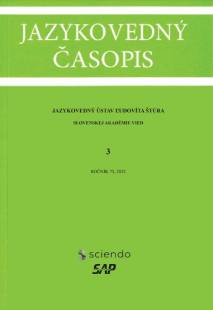Attitudes towards gender-inclusive language among Slovak, Czech, and Polish speakers
Attitudes towards gender-inclusive language among Slovak, Czech, and Polish speakers
Author(s): Martina Ivanová, Miroslava KyseľováSubject(s): Language and Literature Studies, Theoretical Linguistics, Applied Linguistics, Semantics, Sociolinguistics
Published by: Jazykovedný ústav Ľudovíta Štúra Slovenskej akadémie vied
Keywords: gender-inclusive language; language attitudes; generic masculine forms; pair forms; alternative forms; feminine forms; questionnaire
Summary/Abstract: In this paper, the various arguments that have been presented with respect to usage of generic masculine forms and pair/feminine forms are discussed and analysed. The source of the data is provided by a questionnaire carried out in October 2019, including a sample of answers and comments from Slovak, Czech and Polish respondents. In the study, two dominant views on generic masculine forms, arbitrary and semantic, are introduced and discussed against empirical findings from many experiments and studies. The material from the questionnaire is qualitatively analysed with respect to the axiological reactions of the respondents. The language attitudes are further classified into eight categories: representation, offensiveness, addressing, economy, textual qualities, language naturalness, tradition and ideological markedness. The attitudes of participants from both "camps" are quoted to illustrate the argumentation process yielding to the acceptance or rejection of forms substantiating gender-inclusive language.
Journal: Jazykovedný časopis
- Issue Year: 73/2022
- Issue No: 3
- Page Range: 395-420
- Page Count: 26
- Language: English

